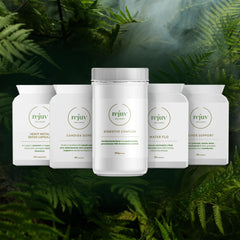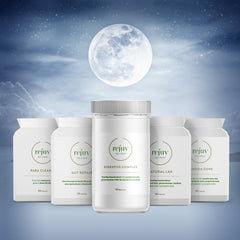The Environmental Working Group (EWG) recently released the 2024 edition of the Dirty Dozen list, a Shopper's Guide to Pesticides in Produce™. This report is not just a list, but a crucial tool for you to reduce the toxic load you accumulate through your foods and protect your health.
EWG found that up to 70% of non-organic foods tested positive for at least one pesticide.
Neutralise Fruit With Pesticides
I'm not suggesting that you should avoid fruits and veggies on the Dirty Dozen List and become a pure carnivore, eating only meat like the latest fad diet (especially since we don't have teeth like lions, so this diet goes against nature).
As always, at Rejuv Wellness, we're here to serve and help you navigate such information for optimum health.
Pesticides, Herbicides & The Food Processing Industry
Over the last 50-60 years, synthetic pesticides and herbicides have increased dramatically to meet the demands of large-scale agricultural production.
The food processing industry has developed various additives, flavourings, colourings, preservatives, and other chemicals to enhance food products' taste, appearance, and shelf-life.
MTHFR On The Rise!
Over the last three to four years, I have also noticed a considerable rise in clients presenting with the gene mutation methylenetetrahydrofolate (MTHFR) both virtually and in our clinics across the globe. This means that many need to methylate/detoxify and deal with chemicals as well as our grandparents did.
A few weeks ago, I unpacked the top eight health concerns associated with having this single or double gene mutation. You can read about this new research here and my solutions to this issue.
I don't have this mutation, but my husband and daughter do, so we all take this bioavailable form of B9 supplement just to be sure (click here for the Methyl Support Capsules).
The Top 7 Symptoms of Poor Methylation
If methylation processes are disrupted or impaired, it can lead to various health issues. Some symptoms associated with poor methylation function or impaired methylation pathways may include:
- Fatigue: Methylation plays a role in energy production, and poor methylation function may contribute to feelings of fatigue and low energy levels.
- Brain fog or cognitive issues: Methylation is involved in neurotransmitter synthesis and regulation, so impaired methylation may affect cognitive function, leading to difficulties with memory, concentration, and mental clarity.
- Mood disorders: Methylation is crucial for neurotransmitter metabolism, including serotonin, dopamine, and norepinephrine, essential for mood regulation. Poor methylation function may contribute to mood swings, depression, anxiety, or other mood disorders.
- Cardiovascular issues: Methylation is involved in regulating homocysteine levels in the blood. Elevated homocysteine levels are associated with an increased risk of cardiovascular disease.
- Digestive problems: Methylation is vital for detoxification processes in the liver. Impaired methylation may lead to inefficient detoxification, potentially contributing to digestive issues or sensitivity to certain foods.
- Hormonal imbalances: Methylation is involved in hormone metabolism and regulation. Poor methylation function may lead to hormonal imbalances, which can affect various aspects of reproductive health, thyroid function, and adrenal health.
- Immune system dysfunction: Methylation affects immune function and inflammation regulation. Impaired methylation may weaken the immune system, increasing susceptibility to infections or autoimmune conditions.
Given that the world is becoming more toxic and many people are not dealing well with toxins, this report is an excellent resource to help us navigate the best fruits and veggies and reduce our toxic load. Plus, we also provide hacks on how to thoroughly clean the dirty dozen below, so we have you covered.
Living In A World Toxic From Heavy Metals & Chemicals
With the world becoming more toxic, we must consider how much we expose ourselves and our children to heavy metals, round up, glyphosate and many other pesticides infiltrating our lives.
How Pesticides & Heavy Metals Enter Your Body
Heavy metal and pesticide poisoning occur when microscopic molecules of metals and chemicals accumulate within the body and attach to cells, preventing them from performing their functions. This can cause symptoms that could be life-threatening without treatment.
From my 25 years of clinical practice, I can confidently say we're all exposed to heavy metals and toxic chemicals. This is not just a theory but a reality I've seen in my clients. That's why I recommend that all my clients do regular detoxes to empty their 'toxic cup'.
All of our guests on our latest Rejuv Retreat in Dubai tested positive for heavy metal toxicity.
Your Metabolism, Toxins & Heavy Metals
Significant heavy metals and toxic build-up affect your metabolism, and the more excess body fat you have, the more toxic you are as toxins take refuge in your body fat as a safe place to hide. Your body fat is like a storage facility for toxins.
Not only do high heavy metals and toxins make it hard to lose weight, but they also impair your lymphatic system, which not only increases cellulite but also impairs your immune system.
The Knock-On Effect On Your Gut-Brain Axis
This, in turn, has a knock-on effect on your gut-brain axis, making you feel mentally and physically weak and out of balance. Heavy metals and toxins also work hand in hand with microbes, parasites and candida, which increase your desire for junk foods, and you are reducing your satiety hormones ghrelin & leptin, so you feel unsatisfied, and it is hard to feel full.
Strategies to Expel Toxins
Weight loss is, therefore, a great strategy to reduce the effect of toxins on your brain and organs. Many people experience headaches, fatigue and nausea when doing a detox as the toxins are mobilised into the bloodstream to be excreted.
So, as you can see, by not emptying your 'toxic cup', you leave yourself exposed to feeling mentally and physically under par, inviting accelerated ageing and disease.
The Shopper's Guide to Pesticides in Produce™
Follow the Shopper's Guide to Pesticides in Produce™ 2024 with the list of foods you should increase and decrease to help facilitate the process of reducing your toxic load.
In addition to the Dirty Dozen, a "Clean 15" list identifies the non-organic produce least likely to be contaminated with pesticide levels.
The Dirty Dozen 2024
These 12 fruits and vegetables were the most contaminated with pesticides of the 46 Environmental Working Group analysis items.
- Strawberries
- Spinach
- Kale, Collard & Mustard Greens
- Grapes
- Peaches
- Pears
- Nectarine
- Apple
- Bell and Hot Peppers
- Cherries
- Blueberries
- Green Beans
They analysed testing data from the Department of Agriculture and Food and Drug Administration with 46,569 samples of fruits and vegetables.
Hacks To Redeem These 12 Fruits & Vegetables
I understand that the Dirty Dozen list might be concerning to you, but I'm not suggesting that you don't eat these fruits and vegetables. Instead, try to buy organic produce or use these hacks to reduce their toxic load:
- Soak in Water and Bi-Carb Soda. As a home remedy to reduce toxins and pesticides, fill your sink with filtered water and two tablespoons of bi-carb soda. Soak the produce for 10 minutes, rinse, and store.
- Clean the Produce with Ozone. The best method to remove pesticides and toxins is to clean your produce using ozone. There is a very insightful article on how to use tap and ozone water, ultrasonic cleaning and boiling to remove pesticides by Researchers from the Plant Protection Institute in Poland.
That is why I use the Therasage Ozone Bubbler, which is around $100 USD and a brilliant investment. Simply fill your sink with your produce, let the bubbler run for 5-10 minutes, rinse, and store. Use the discount code REJUV to receive a 10% discount off this and their entire line.
The Clean Fifteen™
According to EWG's most recent USDA data analysis, these 15 fruits and vegetables had the lowest amounts of pesticide residues.
- Avocado
- Sweet Corn
- Pineapples
- Onions
- Papayas
- Frozen Sweet Peas
- Asparagus
- Honeydew Melon
- Kiwi
- Cabbage
- Mushrooms
- Mangoes
- Sweet Potatoes
- Watermelon
- Carrots
Almost 65% of Clean Fifteen fruit and vegetable samples had no detectable pesticide residues, which is comforting news!
Support To Expel Heavy Metals, Toxins, Pesticides & Chemicals
I recommend that we all cleanse each year. We can choose our Metabolic Reset Pack to reduce body fat and detox or our Detox Pack to focus on expelling heavy metals and toxic build-up.
If you're not ready for a cleanse, you can start by adding our Heavy Metal Detox capsules to your daily routine. If you have any of the seven symptoms listed above, add our Methyl Support Capsules.
If you feel like a full mind-body reset, do our Gut-Brain Reset Pack.
Review Your Seven Pillars of Wellness
To identify which of your top 7 Pillars of Wellness you need to focus on to scale up your health, take our free Wellness Quiz to receive your Wellness Profile today.










